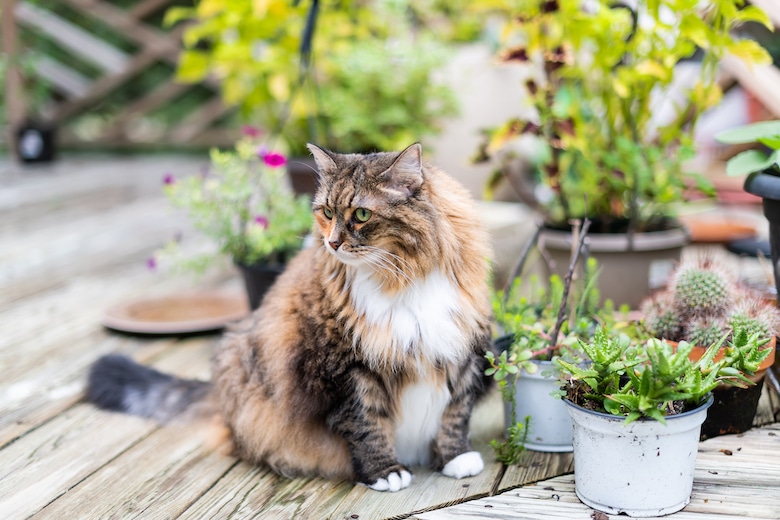Have you ever thought about adding a purebred cat to your family? The Cat Fanciers’ Association recognizes 46 pedigreed breeds, all with different characteristics, appearances and behaviors.
The CFA prefers the term “pedigreed cat,” as many breeds of cats were developed as hybrids or developed crossings. Pedigree references CFA’s ability to trace a cat’s lineage for multiple generations.
What are the best cat breeds for families?
While you might be interested in how a specific cat breed looks, it’s essential to determine if the cat will have the right temperament for your home. Teresa Keiger of CFA recommends the following cat breeds for families with children: American Shorthairs, British Shorthairs, Maine Coon Cats, Exotics, Scottish Fold and Burmilla.
Although these breeds have a reputation of being a good fit for families, especially those with children, it’s still important that children learn how to interact with cats appropriately and for guardians to supervise in kid and cat interactions.
“In terms of young children, it’s not a matter of breed as much as adults supervising interactions appropriately and children being respectful,” says Kirsten Kranz, director of Specialty Purebred Cat Rescue.
What to consider before adding a cat to your family
When adding any cat to your family, it’s essential to think about if your home is a good fit for that cat.
“One thing that makes pedigreed cats special is that most breeds have distinct personality traits across the breed,” Teresa says.
When researching the best cat breeds for your family, Keiger advises doing an honest assessment of your home, lifestyle, family and what they’re looking for from a cat companion.
For example, grooming your Persian (or another long-haired cat) is a great way to bond with them, but if it’s not realistic for you to commit to doing that regularly, that breed will not be a good fit for you. Whereas, if you have an active household, you should look for a breed whose personality will embrace that.
Not all cats are created equally, and the key is to find a breed of cat that will be a good fit for your lifestyle and family.
“Cornish Rex and Japanese Bobtails have a very high energy level, Devon Rex are affectionate clowns, Persians are sweet and low key but require regular grooming,” Teresa says.

Photography by YakobchukOlena/Thinkstock.
If you have young children, you might want to avoid these cat breeds
Although many cats do well as family pets, there are breeds that might struggle with a family with young children.
“Russian Blues prefer a quiet household,” Teresa says. “Turkish Angoras, Egyptian Maus and Cornish Rex are very active and athletic cats, and although they love their people, they may be a little too intense for younger folk.”
Similarly, Kirsten advises that “high-strung breeds like Abyssinians, Orientals and Bengals can be challenging for people not experienced with cats. They are highly intelligent but also active and have their own agendas. They are very independent and need to be appreciated by people who understand the breeds.”
How to reach the best cat breeds for your family?
If you are interested in adding a pedigreed cat into your family, it’s essential to research what life is like with that cat breed.
“It is crucial that potential owners research the breeds, because each is different in personality needs and maintenance,” Kirsten explains.
Purebred cat clubs are a great way to connect with people online, but the best way to research cat breeds is to meet cats and their people in person. Teresa encourages prospective families visit local cat shows (when it’s safe to do so).
Cat shows are a great way to see and meet lots of breeds of cats, and most importantly, be able to connect with breeders and other people experienced with the breed. These breed experts will be able to answer questions that you have and talk to you about what life with that breed is like to help you determine if you’ve found the right breed for your home and family.

Maine Coon Cats, like this, are among some of the best cat breeds for families. Photo: ablokhin/ Getty Images
How to find a purebred cat?
Once you have decided what breed of cat will be the right fit for your family, it’s time to find your new cat or kitten! Be prepared for a reputable breeder to have many questions about your lifestyle, experience with cats and what your home is like.
“A good breeder wants to place their cats in a forever home where they will be cherished; they’re not selling cats like a commodity,” Teresa says. “I often say that breeders are rather like matchmakers, wanting to make sure that that special relationship will last forever.”
If you have decided a purebred cat is the right feline addition to your family, that doesn’t mean that you need to bring a kitten home. In addition to reaching out to purebred cat rescue organizations. Groups like Specialty Purebred Cat Rescue can be a fantastic resource for answering breed questions and often have various cats available for adoptions.
“Breeders often have breeding cats that they are retiring from their programs and are in need of a forever home. PLUS, they’ve already passed the high energy level of kittenhood and are ready to settle in,” Teresa says.
Featured Image: MEDITERRANEAN/Getty Images
Read Next: Your Checklist for Bringing a New Cat Home
